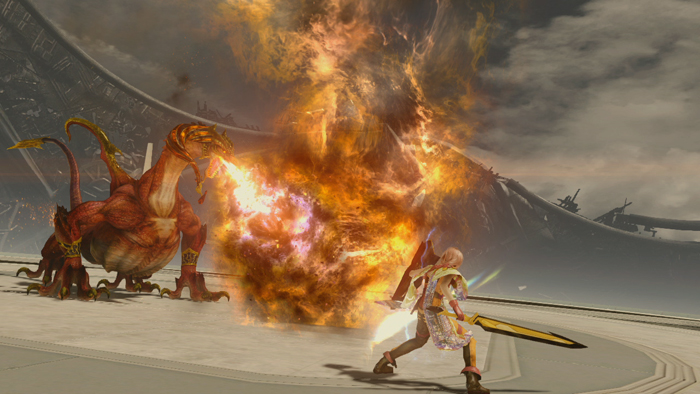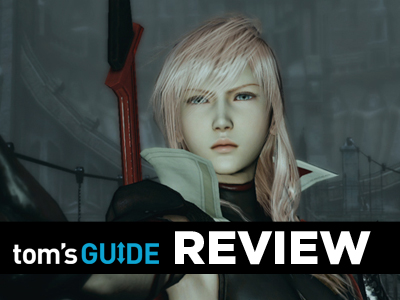Tom's Guide Verdict
"Lightning Returns" completes the long-running "Final Fantasy XIII" story arc, but in a way that's just as polarizing as its forebears.
Pros
- +
Innovative battle system
- +
Tons of ways to customize Lightning
- +
Interesting protagonist with believable behavior
Cons
- -
Punishing difficulty
- -
Unpredictable, inefficient character growth
- -
Depressing, underdeveloped storyline
Why you can trust Tom's Guide
Thirteen days to save the world
Gamers born after 1990 or so may find it hard to believe, but a new "Final Fantasy" game used to be a cause for celebration rather than a lament for a wasted opportunity. The series used to represent the very best characteristics of Japanese role-playing games (JRPGs): charming characters, epic quests to save the world and creative battle systems.
All "Lightning Returns: Final Fantasy XIII" has is a creative battle system.
"Lightning Returns" completes the long-running "Final Fantasy XIII" story arc, but in a way that's just as polarizing as its forebears. The story is intriguing, but mundane; the gameplay is innovative, but punishing. Lightning's latest adventure holds a sea of contradictions, and it's hard to imagine that the game will unify popular opinion any more than its predecessors did.
Gameplay
You'll take control of Lightning, a pink-haired swordswoman who starred in "Final Fantasy XIII" and kicked off the plot in "Final Fantasy XIII-2." She has 13 days to save as many lost souls as possible before God reboots the world and leaves the vast majority of the population behind. Your primary goal is to help as many people as possible by taking on their quests.
MORE: 'Lightning Returns: Final Fantasy XIII': Read This Before Playing
This mechanic effectively makes "Lightning Returns" into a game of seeing how many side quests you can complete in a limited period of time. The game operates on a timer, and if you complete enough quests, you'll gain additional time — up to 13 in-game days, anyway (each "day" lasts for two or three hours, depending on your actions).
Rather than giving "Lightning Returns" a sense of urgency, this situation actually fosters mild distress and panic. Because certain quests can only be completed at certain times of day, and traveling between the game's four main areas takes time, you'll find that you expend a lot of time hunting for quests in the wrong places, narrowly missing your opportunities to complete them and standing around waiting until a certain area opens up or quest-giver appears.
This wouldn't be so much of a problem if quests were not directly responsible for character progression. Lightning can earn money and recharge her special abilities (such as the ability to temporarily freeze time) by fighting enemies, but she can only improve her statistics by completing quests. Stat gains are generally paltry and unpredictable, meaning you'll need to tackle lots of side quests to stand a chance in the difficult, drawn-out main quests.
The battle system is one of the game's high points, although it comes with its fair share of qualifiers, too. As Lightning acquires new outfits, swords, shields and abilities, she can combine them to create Schemata. During battle, she can switch between Schemata at will.
The Schema system is extremely versatile and lets players customize Lightning to both their aesthetic and gameplay tastes. Battles take place in real-time, and each one of Lightning's abilities consumes energy. By switching between Schemata, Lightning can continue attacking and defending almost indefinitely while other Schemata recharge.
In concept — and sometimes in execution — the system is brilliant. Creating a melee warrior, an elemental mage and a defensive sentinel, and switching between them in real-time is both fun and strategic. Most enemies are incredibly tough, though, and require split-second precision to block their devastating attacks.
Staggering enemies — temporarily disabling them to deal more damage — is also very unpredictable compared to previous games, which makes knowing which Schemata to create in advance almost impossible.
"Lightning Returns" has a lot of big ideas, but punishes players for trying to explore them all.

Story
After the events of "Final Fantasy XIII-2," the world of Nova Chrysalia is in a bad state. Time has not flowed in the past 500 years, leaving the human race to stagnate and dwindle. The world is essentially doomed, which is why God, also known as Bhunivelze, has summoned Lightning as his avatar. Lightning has 13 days to save as many souls as she can to be reborn in the new world.
The story in "Lightning Returns" is curious. Examining a human society after 500 years of stalled time sounds like the premise of a great Ray Bradbury or Philip K. Dick story, but the game does not take much interest in these questions, opting instead to focus on its side quests, which are often as simple as defeating a monster or revitalizing an ailing restaurant.
"Lightning Returns" also weaves an incredibly grim, joyless tale. The world is already doomed, and there's no point in trying to save it. Even if Lightning succeeds, the vast majority of humanity will disappear for all eternity. Old friends have turned on her, or become apathetic. She undertakes her journey alone, in part, because so few of her former companions will help her.
The two previous "Final Fantasy XIII" games generally did a good job balancing gloomy and uplifting themes, but "Lightning Returns" tends firmly toward the former — perhaps too much so.
- 1
- 2
Current page: Final Fantasy XIII: Lightning Returns Review - Tom's Guide
Next Page Final Fantasy XIII: Lightning Returns - Pros and ConsMarshall Honorof is a senior editor for Tom's Guide, overseeing the site's coverage of gaming hardware and software. He comes from a science writing background, having studied paleomammalogy, biological anthropology, and the history of science and technology. After hours, you can find him practicing taekwondo or doing deep dives on classic sci-fi.


